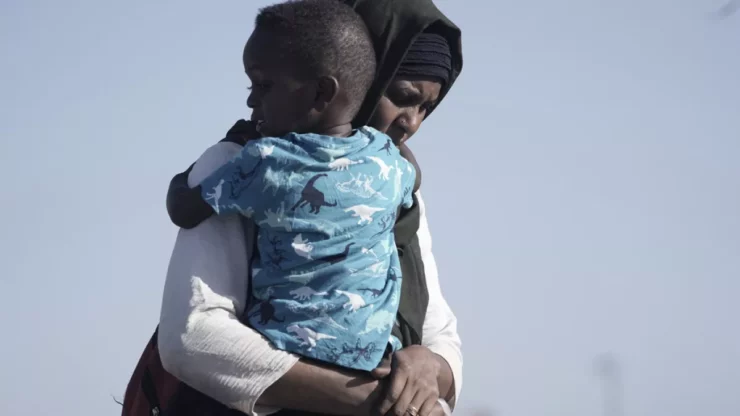
With a record 3.5 million children seeking refugees inside and outside the country, the Sudan crisis has turned into another major children’s crisis, along with Gaza. More than 50 percent of Sudan’s population, 14 million of which comprises children, need humanitarian aid. According to Doctors without Borders, almost 13 children die daily in Sudan due to malnutrition, this is the second-highest number of deaths of children after Gaza. This crisis in the country has been sparked by the civil war between the Sudanese Armed Forces (SAF) and Rapid Support Forces (RSF), which commenced in April 2023. Since then, the country has been home to chaos, famine, and deaths.
The warring parties were allies in the past. Both parties colluded to overthrow the then President of Sudan, Omer al-Bashir – a dictator who ruled the country for more than 3 decades, in 2019. Omer was replaced by General Abdel Fattah al-Burhan, the leader of the SAF, as the de facto leader of the country. Both parties even conspired to successfully overthrow the interim government in the country in 2021. The RSF leader General Mohamed Hamdan Dagalo, aka Hemedti, supported Bashir in both these campaigns.
However, the decision taken by the SAF government, under mounting international pressure to install a civilian regime in Sudan, to integrate the RSF into the national militia of the country provoked a violent insurgency in the country. RSF leaders declared a militarized revolt against the SAF government in April 2023. Khartoum, the capital of Sudan, along with other major regions, has been the center of this war. International efforts sponsored by the Kingdom of Saudi Arabia and the United States have been floundering since the inception of this war. Peace plans proposed by the African Union and other international organizations have also been unsuccessful.
Allegedly, some international forces are also involved in sparking this conflict. A Sudanese Army general has accused the United Arab Emirates of supplying arms to the RSF. The UAE and Saudi Arabia hold great influence in Sudan. The UAE seeks to hold sway over the Red Sea. This makes Sudan a significant country for the UAE to pursue its ambitions. A $6 billion agreement, for the construction of Abu Amama port, has already been signed between the Sudanese government and UAE-based construction companies. However, the accusations of involvement in the war have been refuted by the UAE.
The SAF enjoys close ties with Egypt. Moreover, reports hint towards the military support of the RSF by Libyan warlord Khalifa Haftar. Houthi attacks on Israel-bound ships have put the ports of the country in a highly precarious situation as well. This makes the country engulfed in wars, and chaos from within and without. However, the most alarming aspect of this war is that it holds the potential to spill over into the border countries and the GCC. Therefore, the Arab states are striving for a peaceful settlement in the country.
This war has sparked one of the worst humanitarian crises in the world. The nation was already facing a humanitarian crisis before the outbreak of the civil war due to climate change, political instability, and food inflation. The nation was among the top-listed countries for child malnutrition. Nearly 1/3rd of the Sudanese were highly exposed to water-related issues and diseases. However, the plight of the Sudanese people has been further exacerbated by the commencement of this conflict.
According to the UNOCHA report, cholera cases are suspected to increase in the country. Around 14000 people deaths have been reported in Sudan in the last 10 months. 8.1 million people have been displaced inside and outside the country. The displacement of around 4 million children has made the crisis the largest children displacement crisis in history. Such a huge number of refugees attests to the agony that the Sudanese have endured for the past few months. Reports suggest that the militias have conducted ethnic cleansing operations in Darfur city.
Refugee influx in the neighboring countries has also endangered the security and already stagnant economies of these countries. Refugees face plenty of issues while migrating to neighboring countries and after the migration. In Africa, these refugee flows are often viewed as a source of menace to the security of the hosting country. Therefore, uncertainty looms large over the heads of those aspiring to migrate as their future hinges on the mercy of others.
The Global Hunger Index report ranked 103 out of 125 countries in 2023. Declined harvest in Sudan, due to the ongoing conflict coupled with climate-induced problems, will result in a further surge in food prices, further alleviating poverty and hunger in the country. Sudanese are abused and terrorized in their homeland. Around 18 million people in Sudan are estimated to experience emergency hunger levels, according to the UN. The United Nations has sought $4.1 billion in aid for the nation. However, the hindrance of aid activities by different international organizations due to the violent conflict and the network blackout has further added to the agony and misery of the Sudanese. The world needs to pay greater attention and intensify efforts for a peaceful solution to the issue before its neighboring countries into its folds. The African Union and the Arab League need to play a more active role in stabilizing the region. Otherwise, the fire could engulf the neighboring countries and the Gulf region as well.
Abbas Hashemite – is a political observer and research analyst for regional and global geopolitical issues. He is currently working as an independent researcher and journalist, exclusively for “New Eastern Outlook”.